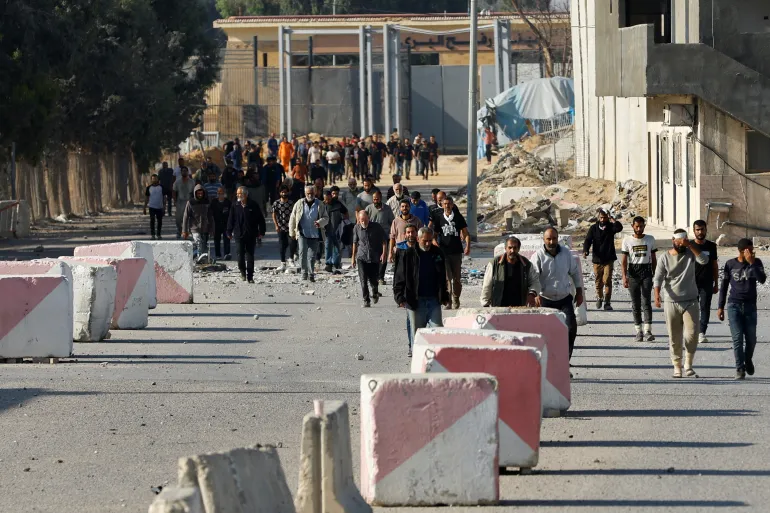
The cross-border workers are returning through the Kerem Shalom crossing after detention and ill-treatment in Israel.
Thousands of Palestinians from Gaza, previously working in Israel and the occupied West Bank and then detained by Israel, are being pushed into the war-torn enclave, according to media reports.
Footage showed some of the workers returning on Friday through the Karem Abu Salem (Kerem Shalom) crossing in Israel, east of the Rafah border crossing between the besieged Gaza Strip and Egypt.
It came after the office of Israel’s Prime Minister Benjamin Netanyahu said on Thursday night that the “workers from Gaza who were in Israel on the day of the outbreak of the war will be returned to Gaza”.
Workers crossing into the Palestinian enclave said they were detained and ill-treated by Israeli authorities in the wake of the October 7 attack by Hamas, the group that rules Gaza, on southern Israel. Some still had plastic stickers carrying numbers around their legs.
“We used to serve them, work for them, in houses, in restaurants, and in markets in return for the lowest prices and despite that, we were humiliated,” said Jamal Ismail, a worker from the Maghazi refugee camp in the central Gaza Strip.
Those from areas in northern Gaza would have to stay in the south after Israeli forces completed cutting off roads linking the two parts of the enclave late on Thursday, according to Palestinian officials.
About 18,500 residents of Gaza held permits to work outside the besieged strip before the war broke out.
The exact number of workers present in Israel as hostilities began remains unknown, but thousands are thought to have been rounded up by the Israeli army and transferred to undisclosed locations.
Jessica Montell, executive director of the Israel-based human rights organisation HaMoked, told Al Jazeera in October that more than 400 families and friends of missing labourers from Gaza had been in touch with the organisation since the beginning of the war.
A group of six local organisations, including HaMoked, petitioned Israel’s High Court to disclose the names and locations of the detainees and to ensure humane holding conditions.
According to the petitioners, some of the Palestinians were detained in the Almon area as well as in Ofer, near Ramallah, and Sde Teyman, near Beer al-Sabe (Be’er Sheva), in the southern Naqab or Negev desert.
Al Jazeera’s Alan Fisher, reporting from East Jerusalem, says that the legal challenge from human rights groups appears to have convinced Israel to start releasing the workers, with about 3,200 believed to have been taken to the Kerem Shalom crossing.
The same human rights organisations are now saying that sending them to Gaza could well end up being a death sentence, he said.
The UN was also disturbed. “They are being sent back, we don’t know exactly to where,” and whether they “even have a home to go to”, and “we are deeply concerned about that”, UN human rights office spokeswoman Elizabeth Throssell told a press conference.

